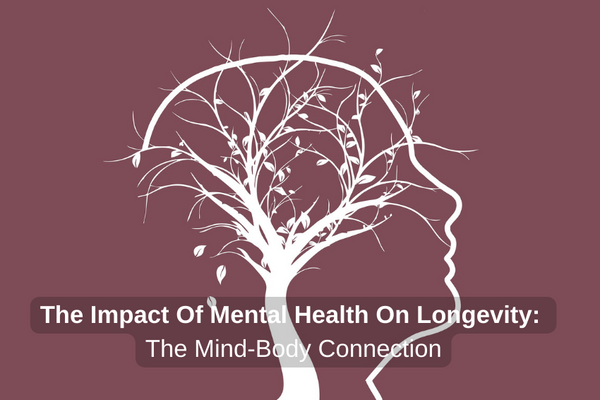
The mind-body connection, a concept widely recognised in holistic health, underscores the profound influence of mental health on longevity and overall quality of life. This multifaceted interaction encompasses various elements, from cognitive impairment and neuropsychology to inflammation and cellular senescence, all contributing to the quality and span of our lives.
Cognitive ageing and mental health are closely entwined, with research revealing that factors like bilingualism and cognitive activity early in life can have protective effects against cognitive impairment later in life, thereby potentially impacting lifespan.
Cardiovascular health, too, is profoundly influenced by mental health. Optimistic attitudes, for instance, have been linked to healthier cardiovascular behaviour, while psychological distress can significantly contribute to disease processes, affecting elements like telomere length, brain structure, and inflammatory gene expression.
Furthermore, biofeedback and mental health promotion play a role in ageing and chronic diseases like neurodegenerative disorders, which are further influenced by processes such as the ubiquitin-proteasome system. Inflammation, often triggered by emotional stress, has been identified as a common pathway in stress-related diseases.
Omega-3 fatty acids, essential for overall health, offer anti-inflammatory properties and support numerous bodily functions. Likewise, sirtuins, which can be activated through a healthy diet and regular exercise, play a critical role in ageing and disease regulation.
While it's important to note that these statements have not been evaluated by the FDA, the evidence underscores the importance of understanding the mind-body connection in fostering longevity and maintaining a high quality of life.
Key Takeaways
- Mental health interventions and mind-body practises can significantly improve lifespan and healthspan.
- Bilingualism and cognitive activity early in life may reduce the risk of cognitive impairment later in life, demonstrating the link between mental fitness and quality of life.
- Optimism is associated with healthier cardiovascular behaviour, while psychological distress accelerates cellular ageing and disease processes.
- Mitochondrial dysfunction, a potential result of emotional stress, and the ubiquitin-proteasome system influence ageing and chronic diseases, while inflammation is a key factor in stress-related diseases.
Mental Health and Longevity
Mental health has a significant bearing on longevity and quality of life. Evidence suggests that individuals with positive mental health and emotional intelligence live longer, healthier lives, a concept supported by mental health promotion [1]
Numerous studies have drawn a correlation between good mental health and increased life expectancy. For instance, those with positive mental well-being tend to engage in healthier behaviours such as regular physical exercise, proper nutrition, and avoidance of harmful habits like smoking or excessive alcohol consumption.
Good mental health also supports better immune function, reduces the risk of chronic diseases, and improves cognitive abilities [2]. Furthermore, positive mental health contributes to the quality of social relationships, offering emotional support and reducing stress levels.
Overall, nurturing mental health is essential for enhancing longevity and overall quality of life. It positively impacts physical health and emotional well-being, supporting various aspects of human life from immune function to social interactions.
Cognitive Ageing and Impacts
Research indicates that bilingualism, cognitive stimulation, and early-life cognitive activity can play a protective role in the process of cognitive ageing [3]. Studies have shown that bilingual individuals may experience cognitive benefits as they age, including delayed onset of cognitive decline and enhanced cognitive performance in tasks related to attention, memory, and executive functions.
The cognitive benefits attributed to bilingualism may be due to the constant mental stimulation and cognitive flexibility required in switching between languages. This can also increase brain resilience, allowing individuals to better adapt to age-related brain changes.
This compelling evidence highlights the potential protective role of bilingualism and cognitive activity in promoting healthy cognitive ageing. However, more research is needed to fully understand the underlying mechanisms and determine the optimal conditions for these cognitive benefits.
Cardiovascular Health and Behaviour
Optimism has been found to be associated with healthier cardiovascular behaviour. This positive mindset has been shown to have significant effects on cardiovascular health and overall well-being. Here are three key findings that highlight the impact of optimism on cardiovascular health:
- Lower Risk of Heart Disease: Research suggests that individuals with a more optimistic outlook tend to have a reduced risk of developing heart disease [4]. This may be due to their ability to manage stress effectively and engage in healthier lifestyle behaviours, such as regular exercise and a balanced diet.
- Enhanced Recovery from Cardiac Events: Optimism has also been linked to better recovery outcomes following cardiac events, such as heart attacks or surgeries. Individuals with a positive mindset are more likely to adhere to their treatment plans, make necessary lifestyle changes, and engage in cardiac rehabilitation programmes, leading to improved cardiovascular outcomes.
- Reduced Inflammation and Blood Pressure: Optimistic individuals have been found to have lower levels of inflammation and blood pressure. Chronic inflammation and high blood pressure are significant risk factors for cardiovascular disease. Positive emotions, such as optimism, can help regulate these physiological processes, promoting better cardiovascular health.
Overall, cultivating optimism can have profound effects on cardiovascular-related behaviour, promoting better heart health and overall well-being.
Conclusion
In conclusion, the mind-body connection is a complex and important concept that highlights the influence of mental health on longevity and quality of life. Cognitive ageing and mental health are intertwined, with factors such as bilingualism and early life cognitive activity impacting cognitive impairment later in life.
Cardiovascular health is also affected by mental health, particularly optimism, which is linked to healthier cardiovascular-related behaviour. Psychological stress has significant effects on disease, contributing to telomere shortening, brain structural changes, and up-regulation of inflammatory gene expression.
Mitochondrial dysfunction and the ubiquitin-proteasome system play roles in ageing and chronic disease, while inflammation is a common pathway in stress-related diseases. Omega-3 fatty acids and sirtuins are important for overall health, reducing inflammation and supporting various bodily functions.
Understanding the mind-body connection is crucial for promoting longevity and maintaining a high quality of life. Embracing mental health interventions, nurturing optimism, and fostering cognitive activities can help us live longer, healthier lives.
